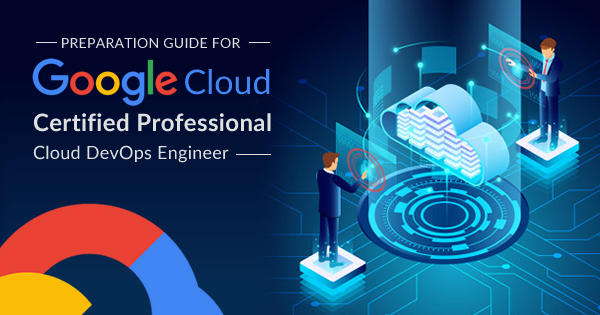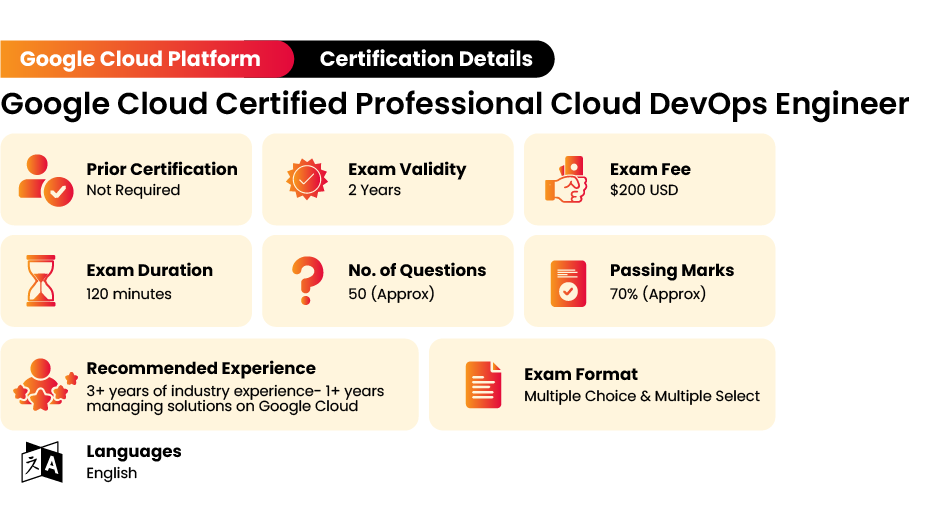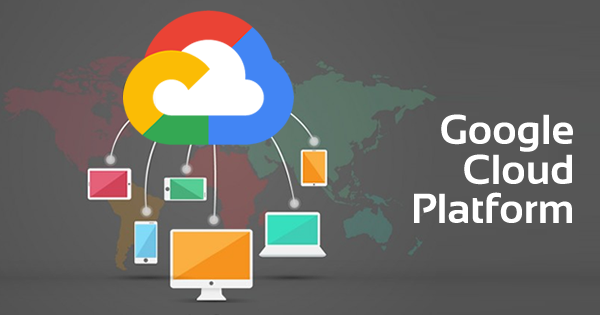Cloud DevOps Engineer Certification is a professional-level GCP certification for experienced cloud professionals who have a proven track record in developing and implementing Google Cloud solutions.
Google Cloud Professional DevOps Engineer exam is designed to validate an individual’s expertise in the core principles and practices of Google Cloud Platform. The exam tests your skills in managing cloud infrastructure, deploying applications and services, and maintaining large-scale distributed systems.
In this blog post, we will discuss all tips and tricks to help you prepare for the Google Cloud Certified Professional Cloud DevOps Engineer Certification exam, including information about the scope of the exam, format, cost, and time allotted for completion.
Let’s begin.
What Is Professional Cloud DevOps Engineer?
DevOps (a combination of development and operations) is a software engineering philosophy that promotes communication, collaboration, and integration between software developers and information technology (IT) professionals. DevOps practices reduce barriers between traditionally separate software development and IT operations. The DevOps philosophy encourages continuous testing, shared responsibilities, collaborative code ownership, interaction with other teams, automation of manual tasks, and increased communication between software developers and IT professionals.
A Professional Cloud DevOps Engineer deploys cloud-based applications and services by implementing industry-standard best practices in cloud development and deployment operations. The Google Cloud DevOps Engineer must be skilled at using Google Cloud to deploy and monitor services, build software delivery pipelines, and manage and learn from service incidents. The DevOps Engineer must align and integrate the business and technology requirements, implement continuous integration (CI) build systems and automate testing processes.
Google Cloud Professional Cloud DevOps Engineer Exam Details
Candidates must familiarize themselves with general exam details. This section summarizes all Cloud DevOps Engineer Certification exam details, including exam length, certification cost, format, delivery method, and recommended experience.
- Exam Length: Two hours
- Registration Cost: $200 (plus tax where applicable)
- Available Languages: English
- Exam Format: Multiple choice and multiple select
- Exam Delivery Method: Online-proctored exam or onsite-proctored exam at a testing center
- Exam Prerequisites: None
- Recommended Experience: 3+ years of industry experience, including 1+ years of hands-on experience on Google Cloud
- Certification Renewal / Recertification: Two years
Google Cloud Professional Cloud DevOps Engineer Exam Topics
Google Cloud DevOps Engineer is an experienced role that helps organizations build efficient development operations and deliver software services reliably and quickly. A cloud engineer must be familiar with various advanced DevOps skills to pass this Google Cloud Professional Certification. Let’s discuss the exam topics in detail.
Site Reliability Engineering (SRE) Principles
Candidates must learn SRE principles and become capable of applying them to a service life cycle. Moreover, candidates should prepare for the following topics:
- Understand SLIs, SLOs, and SLAs to ensure service reliability
- Develop feedback mechanism to improve service and determine next step
- Automate service to eliminate manual processes and increase service robustness
- Capable of creating, managing, deploying, maintaining, and retiring a service
- Establish a professional and healthy environment that eliminates burnout, promotes learning and blamelessness
Implement CI/CD Pipelines
One of the fundamental functions of a DevOps engineer is to create and maintain robust CI/CD pipelines to improve software delivery. A professional cloud developer must be well-versed in building and implementing CI/CD pipelines to deliver a cloud service. Candidates should familiarize themselves with the following topics:
- Implement CI/CD pipelines with Cloud Build
- Familiarity with open-source tools like Concourse, Jenkins, GitLab, and Spinnaker
- Monitor service deployments with Cloud Build, Cloud Audit Logs, Artifact Registry, and CSR
- Securely deploy CI/CD tools like centralized tools, single or multiple-tenant tools
- Manage and monitor local, staging, and production environments with Docker, Skaffold, and Cloud Code
- Securing CI/CD deployment pipelines using Binary Authorization, vulnerability analysis, and implementing IAM policies
Implement Service Monitoring Strategies
To become Google Certified Cloud DevOps Engineers, candidates should know and implement different strategies for monitoring cloud computing services. They must focus on the following topics:
- Collecting structured, application, and third-party logs using Google Compute Engine, Fluentd, and Cloud Logging API
- Managing and monitoring application metrics from Google Compute Engine and GKE/Kubernetes Engine
- Creating, filtering, and sharing dashboards for Cloud Monitoring
- Enabling third-party alerting with tools like Slack and PagerDuty
- Develop and automate alerting policy with Terraform for Cloud Monitoring
- Understanding and using Cloud Monitoring integrations and SIEM tools like Grafana, BigQuery, Splunk, and Datadog
- Understanding, implementing, viewing, and sending logs to manage the Cloud Logging platform
- Setting ACL and monitor access controls with IAM and Cloud Logging
Optimize Service Performance
A cloud engineer must be well-informed about the Google Cloud service optimization techniques to improve service performance. To pass the exam, candidates should focus on the following topics:
- Troubleshooting service performance issues related to image/OS, VPC flow, latency, and cloud resource utilization
- Familiarity of debugging application code with various tools like Cloud Debugger, Cloud Logging, Cloud Trace, and Cloud Profiler
- Identify and consider resource cost, utilization levels, and network pricing to optimize resource utilization
Manage Service Incidents
To pass Professional Cloud DevOps Engineer Certification, candidates must learn to identify, investigate, and mitigate different service incidents. They must focus on the following exam topics:
- Learn effective communication during a service incident by managing roles, handling requests, providing and recording status updates, avoiding burnouts, and managing relationships with stakeholders
- Investigate system collapse or failure to identify the actual cause
- Mitigate the incident impact on end-users by redirecting traffic or rolling back the services
- Fix bugs and verify code changes to resolve any deployment issues via tools like Cloud Build or Jenkins
- Document incidents and communicate action items to stakeholders
Now that we have discussed all major Cloud DevOps Engineer Certification exam topics, it’s time to prepare for the exam.
But if you have never given any certification exam from Google, you must be wondering how do I pass the GCP DevOps Certification?
To help you prepare for the exam, we have discussed some actionable steps below.
Practical Steps to Prepare Google Cloud Professional Cloud DevOps Engineer Exam
The following steps should guide candidates to prepare for the Cloud DevOps Engineer Exam:
1. Read Cloud DevOps Engineer Certification Exam Guide
Google Cloud provides an extensive certification exam guide covering relevant topics. The guide highlights all topics that candidates should familiarize themselves with before appearing for the Professional Cloud DevOps Engineer exam.
Candidates having hands-on experience with Google Cloud can learn each topic quickly by practicing cloud DevOps concepts and techniques on Google Cloud. They should gain practical experience with Google Cloud tools and other services like Compute Engine, Cloud Code, Cloud Build, Anthos, Spinnaker, Google Kubernetes Engine, Jenkins, and more.
2. Follow Cloud DevOps Engineer Learning Paths
Google Cloud offers an extensive learning path for the Professional Cloud DevOps Engineer Certification exam. It equips the candidates with the right tools and information to become a complete Cloud DevOps Engineer.
The Cloud DevOps Engineer learning path comes with four courses and 13 labs, preparing candidates with knowledge of core Google Cloud infrastructure concepts, Google’s SRE culture, designing Google Cloud deployments, and various cloud logging and monitoring concepts. Candidates can choose between online training or instructor-led training as well.
Moreover, Whizlabs also offers a comprehensive course for helping candidates prepare for the Professional Cloud DevOps Engineer certification exam, including 55 videos and four hands-on labs delivered by Certified Google Cloud experts.
3. Read Google Cloud Documentation and Tutorials
Software services and solutions are incomplete without proper documentation. Thorough documentation can save a lot of time for developers and stakeholders.
Google Cloud offers extensive documentation, accompanied by code examples and tutorials. Besides taking the learning paths or courses, candidates should also use the documentation and tutorials for additional reading and preparation.
4. Attend Cloud DevOps Engineer Webinar & Join a Community
Google Cloud also offers webinars to help you prepare for the Professional Cloud DevOps Engineer Certification exam. Google experts share valuable tips and tricks to help you pass this exam.
Additionally, candidates should join local or online communities to engage with other candidates and Google Cloud experts. If you have any queries regarding the certification or exam topics, community experts can resolve them quickly.
5. Hands-On Training
As Professional Cloud DevOps Engineer Certification is an advanced-level certification, candidates must gain extensive hands-on training. Although not compulsory, Google recommends having more than three years of industry experience and more than one year of experience using Google Cloud services before attempting this exam.
Completing hands-on labs available in the Google Cloud learning paths or courses can help the candidate build the confidence needed to attempt the exam. Candidates can also work on personal projects and perform scenario-based experiments to sharpen their Cloud DevOps skills.
6. Review Sample Questions From Google
Sample questions can help candidates familiarize themselves with exam format and pattern. Google provides sample exam questions for the Professional Cloud DevOps Engineer exam. After completing their relevant training, candidates should attempt these questions to build their confidence about the exam format and content.
7. Practice with Sample Exams
Most certification exams are costly. As mentioned above, the Professional Cloud DevOps Engineer Certification costs around USD 200. As a candidate, passing this exam on the first attempt would be your first preference. Take a couple of practice or mock exams to improve your odds.
Mock exams not only mimic the exam content and format but also help candidates in building confidence. If candidates perform well in the practice exams, they can be more confident going into the proctored exam.
Whizlab offers various practice tests with 140 questions in total, including two full-length mock exams and 5 section tests for each portion of the Cloud DevOps Engineer exam guide. Score more on the practice tests to perform well in the actual exam.
8. Schedule Exam
Register for the Professional Cloud DevOps Engineer Certification exam online through webassessor. Choose your certification and select exam delivery as an online-proctored or on-site proctored exam (if available).
Before registering, don’t forget to review the data-sharing policies and terms and conditions for this exam.
9. Exam Day Tips
Regardless of which Google Cloud exam candidates appear for, they must exercise the following cardinal exam day rules:
- Whether you are giving an online exam or an on-site exam, be at least 15 minutes ahead of your schedule. It gives you a sense of preparedness, eventually improving the exam outcome.
- For an on-site exam, make sure to bring along the required documents for identification.
- Check your internet connection and webcam beforehand to avoid delays for an online exam.
- You are not supposed to know the answer to every question, even if you are an expert. It is better to move on so that the rest of the exam is not affected.
- Pace your exam appropriately to avoid any time management issues.
Recertification Policy for Google Cloud Certification Exams
Google Cloud technology is evolving rapidly. Candidates must recertify to maintain their status as Google Certified Professionals. The Professional Cloud DevOps Certification expires after two years. Candidates will receive renewal notifications 90, 60, and 30 days before expiration.
During the 60 day recertification period before the expiration date, Google Cloud Certified individuals can apply for recertification with a 50% deduction on certification cost. However, if anyone gives the recertification exam before the recertification period, Google will reject your exam.
Average Salary of a Google Cloud DevOps Engineer
The average salary of Cloud DevOps Engineers is relatively higher than other software job roles. Their average annual base salary is around USD 130,016, which goes up to USD 213,000 with bonuses and other compensations.
Summary
If you have followed these steps, you are well on your way to becoming a Google Cloud Certified DevOps Engineer.
Once you have obtained the Cloud DevOps Engineer certification, you may try your luck on other professional-level certifications from Google Cloud like GCP Professional Cloud Architect, Professional Cloud Security Engineer, Professional Cloud Network Engineer, or Professional Collaboration Engineer.
Happy learning!




Hi Neeru – Thanks for the article and tips. I did not see Whizlabs having Certification course or the Exam Q&A for the Google DevOp. I have already succeeded in Goggle DE and CA certification using the Whizlab materials – very helpful. When do you plan to have similar material for the Google DevOps? Thank you …
Is practice test available for Google Cloud DevOps Engineer Certification Exam?